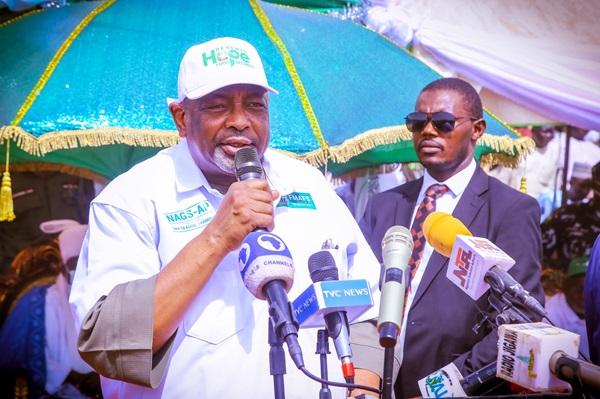
In a proactive move to address food insecurity, combat inflation and respond to President Bola Ahmed Tinubu’s emergency declaration on food security, the Federal Ministry of Agriculture and Food Security has launched the 2023/2024 dry season wheat farming under the National Agricultural Growth Scheme and Agro Pocket (NAGS-AP) project.
The ambitious project targets an expected yield of 1,250,000 tonnes of wheat production per year, aiming to reduce food inflation, increase production, promote self-sufficiency and stimulate economic growth.
Speaking during the flag-off ceremony in Kadume, Hadejia local government area, Jigawa State, the Minister of Agriculture and Food Security, Sen. Abubakar Kyari, explained that “as part of the initiative, the Federal Government aims to support about 150,000 to 250,000 farmers with a 50 per cent input subsidy to cultivate between 200,000 to 250,000 hectares and achieve an expected yield of 1,250,000 tonnes of wheat”.
The minister emphasised that the dry season farming is integral to the National Agricultural Growth Scheme and AgroPocket (NAGS-AP) project, made possible by a $134 million loan facility from the African Development Bank (AfDB). He stated, “This administration is resolved to expand the capacity of our farmers to engage in the cultivation of key staples like rice, maize, cassava and wheat across the country”.
Kyari highlighted that the program would be technology-enabled, ensuring transparency and accountability in subsidy provision and other support services such as extension, insurance and additional finance. He mentioned, “The farmers will be guaranteed access to improved seeds – in this particular instance, deploying heat-tolerant wheat varieties like Borlaug 100 and Attila, among others”.
The minister assured that the Federal Government would invest progressively in irrigation infrastructure projects to optimise water usage and mitigate challenges posed by the dry season. He emphasised the innovative use of information and communication technology to target proven irrigated farm clusters, deploy verified farmer data, and map farmers to agro dealer redemption centers.
Kyari urged relevant stakeholders, the private sector and civil society to seize the opportunity of the 2023/24 dry season farming initiative to usher in a new era of agricultural prosperity and ensure a brighter future for Nigerians. “Together, we can transform our challenges and pave the way for a sustainable and food-secure nation. Let us dare to renew our hope,” he said.
In his remarks, the governor of Jigawa State, Mallam Umar Namadi stated that the initiative aligns with the state’s 12-Point Agenda for Greater Jigawa, particularly concerning food security, economic diversification, job creation, sustainable livelihoods and poverty reduction. He expressed optimism that the capacity of over 42,000 smallholder farmers would be significantly expanded through their participation in the programme.
Namadi urged the Federal Government to accelerate the completion of the Hadejia Valley Irrigation project, initiated in the early 1980s, with the potential to irrigate over 25,000 hectares and significantly contribute to President Tinubu’s ‘Renewed Hope’ agenda’s food security objective.
The national project coordinator, Isayku Buba highlighted that the program would be technology-enabled for transparency and accountability in subsidy provision and other support services, including extension and insurance. The event’s highlights included the distribution of agricultural inputs and the display of brand-new tractors, underscoring the commitment to modernising and boosting Nigeria’s agriculture sector.


